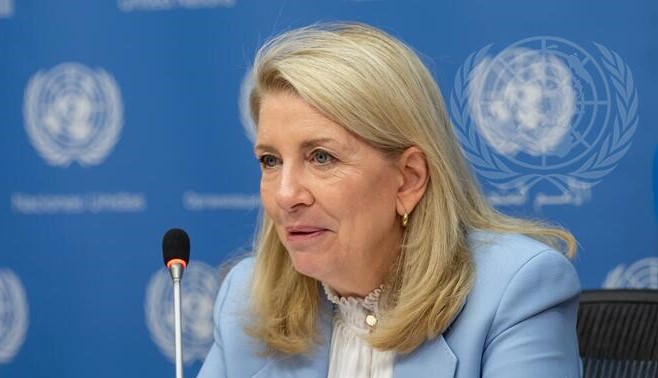Sudan is now the largest and most devastating humanitarian crisis in the world, nearly two years into a conflict that has pushed the country to the brink of collapse, a UN official has said.
UNICEF Executive Director Catherine Russell told a UN Security Council meeting in New York on Thursday that more than 30 million people in Sudan will require humanitarian assistance this year, as the country’s social services and infrastructure teeter on the edge of failure.
Ms Russell said 16 million of those affected are children.
“The fighting is happening right at their doorsteps – around their homes, schools, and hospitals – and across many of Sudan’s cities, towns, and villages,” she said.
“UNICEF continues to receive alarming reports of grave violations against children trapped in this conflict, including their recruitment and use by armed groups,” she added.
The UN official also raised concerns about the widespread use of explosive weapons, which she said have a devastating impact on children. She warned that the long-term effects of these weapons would persist even after the conflict ends.
Ms Russell highlighted the challenges faced by humanitarian actors, who often encounter obstacles in obtaining permits to deliver supplies to conflict-affected areas.
“Humanitarian actors must be ready to seize all crossline and cross-border opportunities to deliver lifesaving supplies across the country,” she said.
She urged the international community to unite in calling for the protection of children and the infrastructure they rely on for survival, in accordance with international humanitarian law, human rights law, and basic principles of humanity.
Ms Russell called on the Security Council to press donors to ensure that UNICEF and other humanitarian organisations can continue their work in Sudan.
“Only a massive mobilisation of resources can save their lives and futures,” she said.
UNICEF Sudan estimates it will need $1 billion in 2025 to provide lifesaving support to 8.7 million vulnerable children.
“Now, more than ever, flexible funding is essential to ensure humanitarian actors can respond quickly to emerging crises and sustain the services children need to survive – including nutrition, water and sanitation, child protection, health, and education,” Ms Russell said.
“These investments are urgently needed to prevent the further collapse of critical social service systems in Sudan.”
She warned that without urgent action, the crisis would overwhelm Sudanese society, leading to exponentially increasing suffering and a generational catastrophe that threatens the future of Sudan, the region, and beyond.




